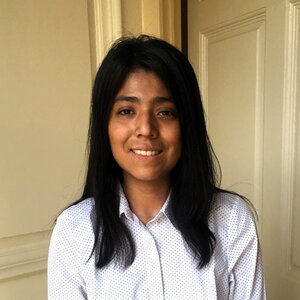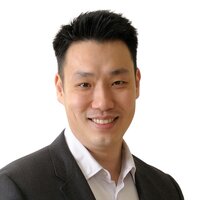Melissa Lucero (PhD, ’22) first learned that in vivo imaging could be used for fluorescence-guided surgery and therapies as an undergraduate researcher at the University of Maryland, Baltimore County.
The positive impact of this experience led her to pursue a PhD in Chemistry at Illinois under the mentorship of Prof. Jeff Chan.
During her graduate studies, Lucero was involved in multiple research projects, gaining a myriad of skills enabling her to design sophisticated molecules that can be employed for a wide range of impactful biomedical applications. One such example is the development of an activity-based sensing probe to detect elevated levels of a key cancer biomarker in lung cancer. Lucero cleverly combined this technology with photoacoustic imaging, a non-invasive method that combines the precision of optical methods and the noninvasiveness of ultrasound imaging, to produce high-resolution images of the biomarker deep within tissue.
Lucero’s thesis research focused on a unique approach to achieve this. Rather than developing chemicals that report on how much of a biomarker is present, her tools go beyond this to reveal what a biomarker is ‘doing’ in a tumor at a specific moment. This strategy enabled Lucero to see a broad range of ambitious projects come to fruition such as tests that can help doctors match patients with the right drug and chemical probes that can potentially replace invasive biopsies with safe imaging techniques.
“This kind of work has always interested me. I have always liked the idea of designing and synthesizing molecules for specific applications,” said Lucero, whose graduate research and thesis were instrumental in her selection for a 2024 ACS National Award – the Nobel Laureate Signature Award for Graduate Education in Chemistry – that she and Prof. Chan will be presented in March 2024.
“I am very happy that this award recognizes Prof. Chan because he has been an outstanding mentor. It is clear that he puts in a lot of time and effort to guide his students. I don’t think I would have been as successful without his mentoring style,” said Lucero.
Lucero herself has become a prolific mentor, being recognized as a recipient of the Professor Gary Schuster Mentoring Scholarship while at UIUC. The scholarship is awarded to graduate students who demonstrate outstanding mentorship of undergraduate students.
Now, Lucero is an iCURE Postdoctoral Fellow in Dr. Martin Schnermann’s lab at the National Institute of Health’s National Cancer Institute, where she is continuing her work developing contrast agents for in vivo fluorescence imaging.
“Being able to design molecules that function the way they were designed to is one of the most exciting parts of my research,” said Lucero.
Specifically, Lucero’s work at NCI focuses on developing dyes that can be used to track internalization of the antibody-fluorophore conjugate for understanding the kinetics of antibody-drug conjugates (ADCs). ADCs are a class of biopharmaceutical drugs designed as a targeted therapy for treating cancer that, unlike chemotherapy, are intended to target and kill tumor cells while sparing healthy cells.
“Work in this area can help establish criteria and new design strategies for improved antibody-drug conjugates with increased uptake and reduced toxicity,” said Lucero, who is a native of Silver Spring, Maryland, and not far from home in her postdoctoral position at NCI in Frederick, Maryland.
Lucero said she was very excited when she heard that she and Prof. Chan won the ACS National Award.
“It encouraged me to continue to do the best that I could on my work. As a Mexican American with parents who had not gone to high school, I had stepped into grad school with no idea how it was going to go or was supposed to go. Successfully graduating with a PhD truly shows the hard work and dedication I put into my research, and I believe this award recognizes that,” Lucero said.
In high school, Lucero said she was an average student in chemistry, but she enjoyed learning the concepts and knew that learning chemistry would allow her to pursue her interest in designing molecules that could be used to diagnose, treat, or cure diseases.
“In college, I learned to focus and truly understand the concepts which earned me perfect scores on exams. This encouraged me to go deeper into chemistry and move into research,” Lucero said.
Growing up in the Eastern United States as a first-generation college student, Lucero said she was not familiar with UIUC. But during a summer undergraduate research experience as an Amgen Scholar at Stanford University, chemistry Prof. Carolyn Bertozzi encouraged Lucero to apply to UIUC and other top chemistry graduate programs in the nation.
“After visiting UIUC, I felt that I would be supported and the potential research projects I could work on highly aligned with my interests,” Lucero said. “I think the key to my success has been hard work and meeting people who genuinely care about my growth as a scientist and as a person.”

